Caught between growing extremism on the right and a battered left, Israelis are flocking to a new crop of centrist politicians who prioritize economic issues over solving the Israeli-Palestinian conflict.
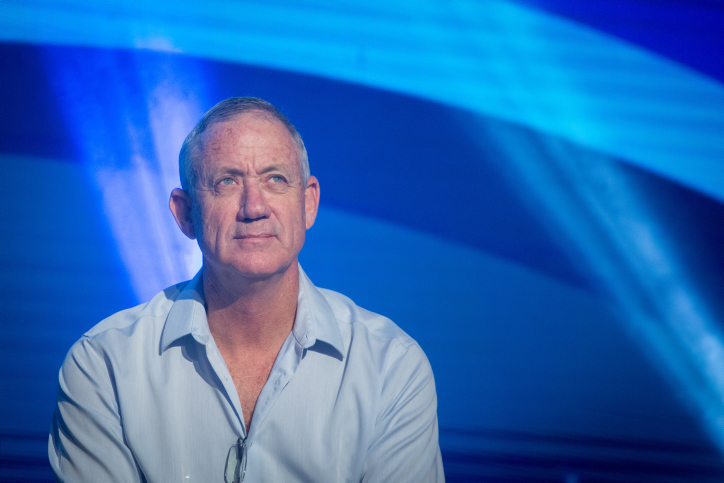
Galia Ben Haim discussed her political opinions while driving back from jail. In addition to her day job, she volunteers at a women’s prison. The inmates, she says, committed their crimes after Israel’s social institutions failed them.
In the last two elections the 48-year-old mother of four says she voted for Yesh Atid, the centrist party founded by TV icon Yair Lapid in 2013. She is considering supporting them a third time when Israel holds general elections in April. “I really care about social issues,” she explains. “We need to rehabilitate families, help social workers, welfare agencies, women who are in prison, the poor,” she says.
Over the last two electoral cycles, Israel has experienced the rise of a new kind of political center in an arena generally seen as a battle of left and right, largely due to voters like Ben Haim. There are now two main centrist parties in Knesset, Yesh Atid, and Moshe Kahlon’s Kulanu, which first competed in 2015. Together, they hold 21 of the Knesset’s 120 seats.
This is an important development, given that the Israeli electorate is weighted in favor of another right-wing victory. Only around 20 percent of adults in Israel self-define as left wing — not enough for the left to win an election. Any chance for a real change of government will have to come from the center.
By contrast, the center camp shows potential for growth. In 2015, the two parties won just over 16 percent of the vote (10 seats for Kahlon and 11 for Lapid). Yet in surveys, about one-quarter of Israelis regularly self-define as centrist. In other words, 10 percent of Israelis are potential swing voters for centrist parties. Those numbers could be augmented by moderate right-wingers who are increasingly disenchanted by Netanyahu’s longevity in power, the corruption investigations against him — or simply his rhetoric and style of governing.
Ronen Ashkenazi, 42, runs a kiosk in the heart of Tel Aviv. He considers himself to be centrist and has supported Likud in the past but voted for Yesh Atid in more recent elections. Now he’s not sure which party to vote for, but Netanyahu has to go. “Enough of Bibi already – he’s corrupt, he needs to go home. He’s fake.” As an example, he cites classic Netanyahu rhetoric: “Bibi says everyone who’s not with him is left wing, and of course I don’t agree with that. But some people do – it’s sad.”
Politicians have taken note. Orly Levy is a sitting member of Knesset who broke away from the right-wing Yisrael Beitenu party to form a new list many consider to be centrist, which is polling regularly at four or five seats. The country’s latest fascination, former Chief of Staff Benny Gantz, is already appealing to centrist voters. His party is polling at a range of 13-16 seats although he has said little about what his policies might be.
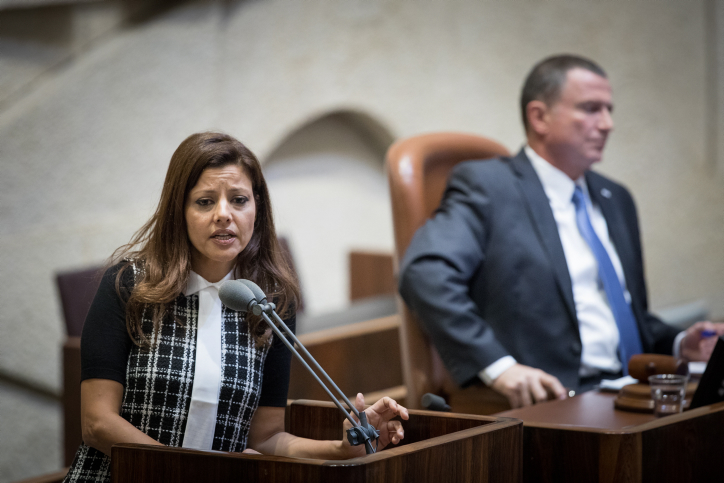
Tzipi Livni’s party, The Movement, now untethered from Labor, is arguably centrist, though in surveys it is struggling to pass the parliamentary threshold of 3.25 percent. Labor has tried to label itself as centrist but is polling in single digits, and for most Israelis, is still synonymous with left. As Ronen from the kiosk put it, he’s undecided but definitely won’t vote left. “I want to take care of Israel,” he said as a matter of course.
[Disclosure: The author has provided research advising to The Movement for a limited project. She is no longer engaged by any of the political campaigns.]
Even without Labor, the number of parties competing for centrist voters has at least doubled since 2015. While there is some internal cannibalizing among them, the general center camp seems poised to grow.
What does the center hold?
So far these modern centrist parties have offered little hope that they will address the Israeli-Palestinian conflict in any meaningful way. Just raising the issue – beyond security bluster – is considered a lefty-trope kiss of death.
Yair Lapid established his party on the heels of an Occupy Wall Street-style social justice protest against cost of living and housing in summer of 2011. The spirit of the protests buoyed him to 19 seats in his first run. His party pays lip service to a two-state solution but does little, and he eagerly joined Netanyahu’s government in 2013.
Kahlon, too, arose from relative political obscurity by completing a regulatory reform of Israel’s rapacious cell phone market, slashing prices in every Israeli household. He broke from Likud to establish his party focused exclusively on economic issues, and doesn’t even bother with lip service regarding the conflict.
In most Israelis’ minds these dollars and cents (or shekels and agurot) issues often get fused with other social problems. The 2011 protests voiced a cacophony of complaints about education, health care, the problems of vulnerable groups, to name a few. In the following years, a diverse class of new politicians emerged with commendable expertise in various domestic causes.
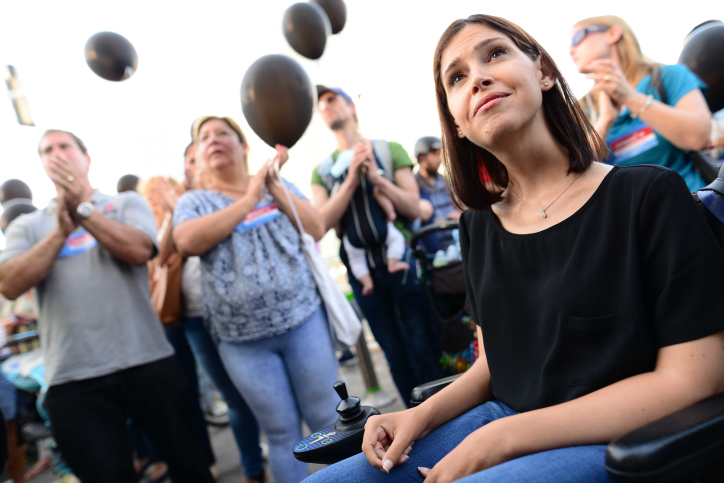
MK Karin Elharar of Yesh Atid is a model centrist. Elected in 2013, the 41-year-old is young enough to represent change and old enough to have proven her devotion to social causes. She was a lawyer working for the rights of the disabled, the elderly, Holocaust survivors, and people in poverty. In Knesset, she notes proudly, she advanced successful legislation to improve early-child care and facilitate mortgage options for disabled people.
Rachel Azaria entered Knesset in 2015 with Kulanu after years of social activism in Jerusalem. The same age as Elharar, Azaria is religious herself, but became an organizer against ultra-Orthodox gender discrimination and religious coercion over other areas of life. She went from community activism to Jerusalem municipal politics to the national stage.
In a telephone interview, Azaria says that she chose to join Kulanu in 2015 to rise above the polarization of Israeli politics. “It was all ‘us or them’ all the time. The only one that didn’t speak like that was Kulanu. They said, ‘what will we actually do? How we will improve people’s lives?’” She believes that people support the center because they seek moderation and cooperation, especially at a time when the right in particular has become more extreme.
Azaria has announced that she won’t run with Kulanu this time. But her explanation also shows how daily-life economic issues and social policy problems morph into a less tangible concern for the feeling that Israel’s social fabric is tearing apart.
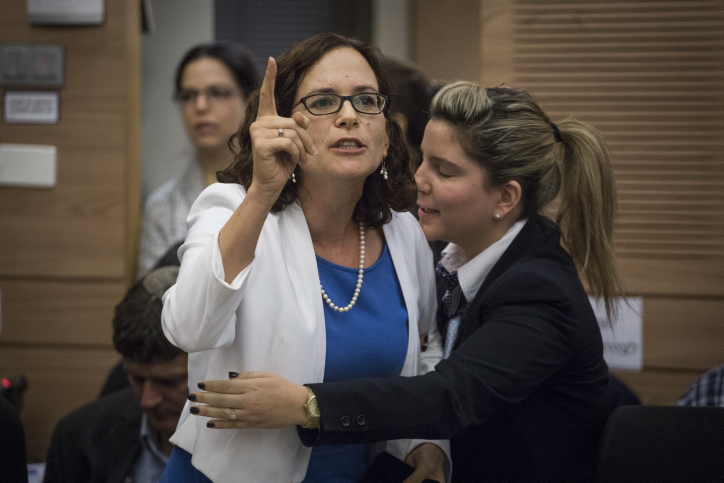
Voters regularly complain about internal cleavages over the years, a lack of solidarity, vitriolic and even violent discourse in the social-media age, none of which are unique to Israel, and include a measure of romanticizing the past. But the desire to smooth out society seems to be another aspect driving voters towards center parties – perhaps in the hope that pragmatic partnerships will yield practical answers.
Maxim Sorin is a 30-year-old high-tech worker originally from the southern coastal town of Ashkelon. He was born in Belarus, immigrated with his parents when he was three years old, and now lives in Tel Aviv. He says he would consider voting for a center party if he trusted them more, because “I would like try to find a common theme, without extremes, less calculated and less populist.”
Sorin says the issues most likely to determine his vote include religion and state and the economy. “Both left and right parties are doing good things,” he says, noting that Meretz supports a strong social safety net for weaker populations, but he also believes in support for growth, innovation, and business.
“If Kahlon runs on economic issues,” he continues, “like reducing customs duties and cost of living, increasing competition among banks and ending cartels – well, he didn’t manage to do those things. If he did I would have been happy to vote for him.”
With regard to the conflict and security issues, Sorin describes himself as “left-pragmatic.”
“But I think it’s too loaded,” he explains. “I’ll let others vote on that ticket. I prefer to try and improve my life in terms of what is possible.”
Could the conflict be making a comeback?
This was precisely my understanding of centrist voters in recent years. They weren’t buying the right’s security obsession, but felt that the “peace” or “compromise” being offered by the left (in a reductive view) was simply impossible and therefore irrelevant. They fled to quality of life issues and tried to forget about the occupation. In one survey I conducted in 2017, the top reason all Jewish voters gave for supporting a centrist party in theory, no matter which party they supported at the time, was social-economic issues.
Lapid’s Yesh Atid and Kahlon’s Kulanu seemed happy to comply, sticking close to their social-protest themes. But the early weeks of the current campaign show scattered signs of change.
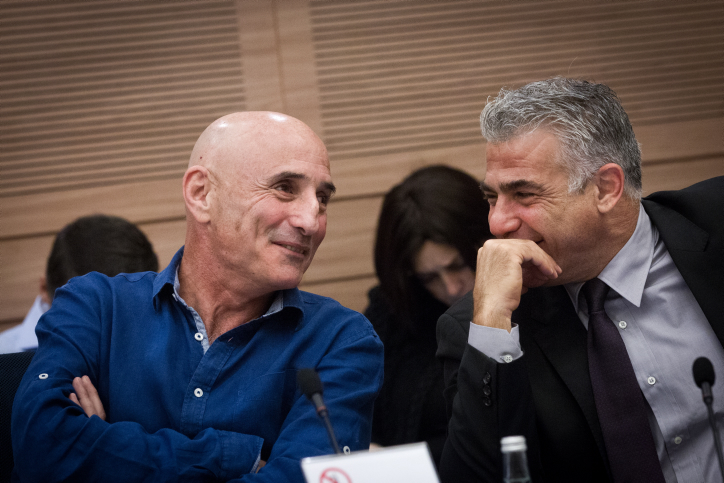
Ofer Shelah, a prominent Yesh Atid MK and a former celebrity journalist, is not eager to comment on what it means to be a center party. “I don’t like those definitions – I like issues. I don’t care what shirt we put on it. It’s passé,” he says, referring to the left-right axis. Fine for me, I respond – I find issues pretty exciting. But when I ask which ones, he gets elusive again.
“Voters care about every issue in the world.”
“What about your voters?” I ask. “The people you meet every day?”
“I don’t deal with those questions, that’s for strategists and journalists. We are a party of leadership – we are not a sectorial party, not about a single issue. I don’t know which is more important, the ‘diplomatic’ issue [a euphemism for the conflict -ds], corruption, or economic issues. The thing is to present the big issues – and get votes.”
At first, Shelah sounds like a perfected page of “Our Gang,” Philip Roth’s parody of Nixon-style non-content speech. Apparently it was innovative once.
But Shelah’s point might reflect something deeper. Moshe Kahlon has decent personal ratings in surveys, but his party is polling below its current Knesset strength of 10 seats. Voters in focus groups admire Orly Levy for her commitment to social-welfare issues, but call her party nisha – a niche party.
“You see how many votes the parties that deal only with social-economic issues are getting in polls,” a senior figure on Gantz’s campaign says, while assuring me that Gantz would show that his party will address security and social-economic issues alike.
But for now, Gantz, the retired general, began his campaign exclusively – and infamously – with the issue of security and the conflict. A salvo of four online ads last week generated media hysteria and a measure of public nausea (even from some right-wingers) by boasting about destroying Gaza during recent wars he oversaw. One video featured a running body count of the terrorists he has had killed.
But one of the four video spots was devoted to something almost all of the other parties prefer to avoid: peace.
Gantz has gouged into Lapid’s numbers, and Lapid is probably none too happy, after running solidly second in nearly all polls for three years. These days Gantz frequently polls second. Lapid, who has never been shy about his ambition to be prime minister, may now be internalizing that to compete for the top, his party can be neither mute nor agnostic on the conflict.
Karin Elharar says that Yesh Atid’s has always had a two-state platform, with a “high wall and a demilitarized [Palestinian] state.” Lapid himself opened the party’s campaign at a launch event saying he is “ready to enter the Prime Minister’s Office tomorrow morning and begin working.” Sandwiched inside a domestic-heavy to-do list, Lapid slipped in “going to a regional convention to begin separation from the Palestinians.” He also mentioned “deterrence against Hamas,” as if checking a box. Likewise, Tzipi Livni’s fight to stay in the Knesset is notable partly for her willingness to address peace – in her vision, in order to preserve a Jewish and democratic state.
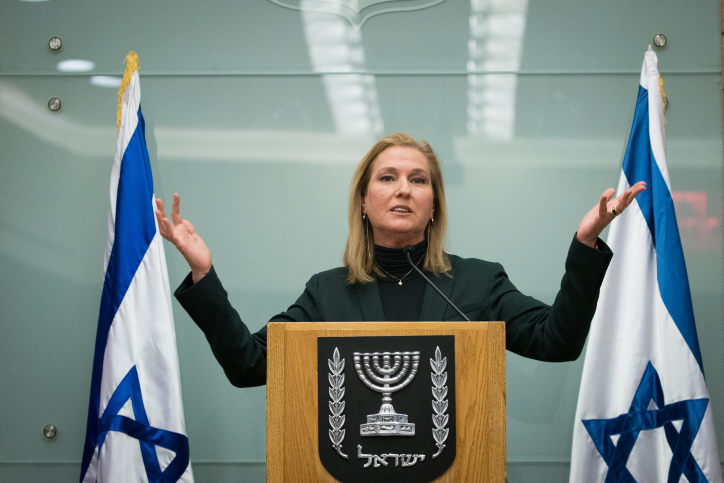
In fact, polling on self-defined centrists shows that it makes sense to bring back the conflict. For at least a decade, my studies have consistently shown that centrist voters are closer to the left than the right when it comes to the two-state solution. Nearly two-thirds of the center support the general principle in our last Israeli Palestinian survey from June 2018. In a survey I conducted for B’Tselem in 2017, a solid majority, nearly 60 percent of centrists, said settlements are harmful rather than helpful to Israeli security.
Sorin, the high-tech worker, says that peace might seem like a lost cause for now, but even the right will eventually have to address it. “Israelis can ‘manage’ the conflict, but morally and practically, it’s not true. It’s driving our society down in long term,” he explains, and linking the conflict with the social issues of the center. “If we had…a different kind of education, things could get better. They go together. [The conflict] influences education in order to justify itself.”
The reverse is also true, Sorin adds. “Tolerance of other through education will make it easier to find empathy for Palestinians … Understand their needs, hopes, justifications. I would like the other side to make those efforts in education too.”
It’s also notable that polling shows the centrists closer to the left than the right on many of the democracy issues on the agenda in the current elections, as well as religion and state.
Talking to these voters, I found that centrist Israelis who look carefree about the conflict on the surface aren’t as dismissive as they seem. Instead, they seem more depressed, confused and hopeless, gravitating towards issues where they still expect a possibility of change.
Ben Haim, the organizational coach, explains that she voted for Lapid because “I’m an optimist in my nature. I’m hopeful.” Nearly her whole family is right-wing, she says, and when I ask if peace and the conflict factor into her thinking, her first response is a hushed “I don’t know.”
“There’s no path for security and peace. It’s not like the Oslo era, when there were talks — nowadays everything’s stagnated,” Ben Haim explains. But she doesn’t sound opposed; more like someone waiting for leadership. “Maybe someone has to come along who’s not Bibi and fantasize about a new path, not left or right,” adding, “maybe we need a new kind of peace.”

